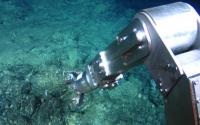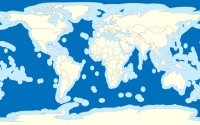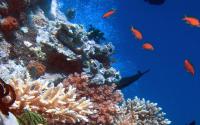News: By Source

The solutions to climate change—solar panels, windmills, electric cars—seem so blissfully clean and also within reach. Yet they also require vast amounts of minerals: cobalt, manganese, copper, nickel, and rare earths and meeting that demand will likely require reliance on deep seabed mining which has its own environmental risks and tradeoffs.
[ More ]
The author argues that the recent outrage over U.S. freedom of navigation operations in India's territorial waters are not a concern as both India and the U.S. are in alignment about the need to enforce UNCLOS provisions, it just may not be politic for both sides to admit as much.
[ More ]
The author argues that U.S. Freedom of Navigation Operations (FONOPs) in East Asia are increasingly provocative and prone to accidents and they could lead to "a long, drawn-out crisis that, even if it stops short of war, would prove highly disruptive to U.S. efforts to cooperate with China on areas of great import."
[ More ]
The authors review the threat from China's aggressive claims in the South China Sea to the global maritime order and recommend a number of ways (short of ratifying UNCLOS) that the U.S. can "safeguard U.S. interests and raise the costs of further destabilizing Chinese behavior."
[ More ]
The author advocates for a more muscular deterrent with China by stepping up its committment to freedom of navigation operations in the South China Sea to make U.S. resolve more apparent.
[ More ]
Senator Ben Cardin of Maryland, argues that with China rejecting the UNCLOS tribunal's ruling regarding their South China Sea claims, it is time for the U.S. to lead by example and ratify UNCLOS to help preserve the global maritime rule of law.
[ More ]
The United States is poised to send naval ships and aircraft to the South China Sea in a challenge to Beijing’s territorial claims to its rapidly-built artificial islands, according to U.S. officials.
[ More ]
The Global Ocean Commission reported in late June that the ocean, the planet’s largest and least-protected bioregion, is close to collapse. The independent body, which includes former heads of state, government ministers, and ocean scientists, points to a perfect storm of escalating threats to the sea: overfishing, habitat loss, and pollution, as well as ocean acidification and warming due to climate change.
[ More ]
The author lays out a plan for how the U.S. can help ease tensions in the Arctic, including by improving international cooperation, developing better relations with Russia, and increasing investments in "technologies that enable safe operations and monitor the environment".
[ More ]
Admiral Greenert, current U.S. Chief of Naval Operations, details the four ways in which the U.S. Navy is pivoting towards Asia: "deploying more forces to the Asia-Pacific; basing more ships and aircraft in the region; fielding new capabilities focused on Asia-Pacific challenges; and developing partnerships and intellectual capital across the region."
[ More ]